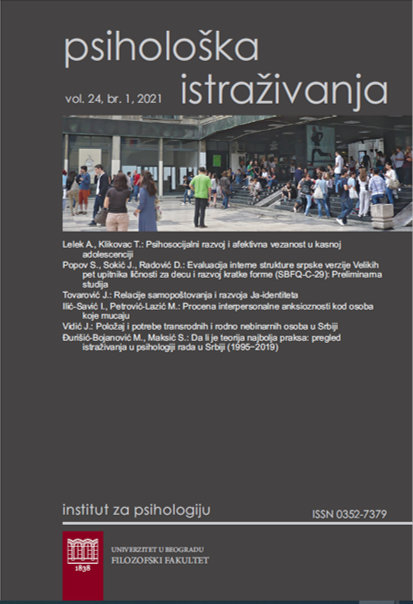Procena interpersonalne anksioznosti kod osoba koje mucaju
Assessment of interpersonal anxiety in stutters
Author(s): Ivana Ilić-Savić, Mirjana Petrović-LazićSubject(s): Psychology
Published by: Филозофски факултет, Универзитет у Београду
Keywords: interpersonal anxiety; stuttering; rehabilitation;
Summary/Abstract: Stuttering is defined as a speech disorder characterized by involuntary repetitions and prolongations of speech elements, i.e. voices, syllables or words. The evaluation of interpersonal anxiety in stuttering pathology should indicate and encourage a new perspective and provide a conceptual approach that has the potential to enable better understanding of the affective field of a stuttering person, thus completinga guide to stuttering rehabilitation. The aim of this study is to compare the degree of interpersonal anxiety of stuttering subjects and the typical population and the potential effect of age differences and different forms of stuttering on the degree of nterpersonal anxiety. The sample included 48 subjects, 24 stuttering subjects and 24 non-stuttering subjects. Interpersonal anxiety was evaluated using the Willoughby questionnaire which assesses the degree of interpersonal anxiety. The obtained results show that the subjects who stutter are more anxious than the subjects of the typical population [F(1, 44) = 13.66, p <.01]. Stuttering subjects from the older age groups have exhibited a higher degree of interpersonal anxiety compared to younger subjects [F(1, 22) = 8.544, p <.01]. There are differences in the degree ofinterpersonal anxiety in people who stutter with respect to the form of stuttering [F(2, 21) = 80.83, p <.01] – the people who have a severe form of stuttering are more anxious than the people who have a mild and moderate form of stuttering. Studying of the relationships between these disorders is essential for strengthening and supplementing the existing prevention measures, but also for encouraging the development of new prevention programmes aimed at forestalling occurrence of anxiety by gaining the ability to successfully overcome emotional discomfort associated with speech. The obtained findings underscore the importance of stuttering assessment and therapy in adults and suggest that the integration of interventions by speech therapists and clinical psychologists could be beneficial for this population.
Journal: Psihološka istraživanja
- Issue Year: 24/2021
- Issue No: 1
- Page Range: 63-74
- Page Count: 12
- Language: Serbian

